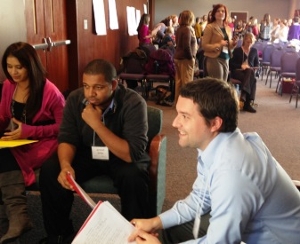Ethical Reasoning Encourages Inter-Professional Collaboration
Ethical Reasoning in ActionBy Erin Phillippi ('08M)
In the fall of 2013, 80 undergraduate and graduate students from the JMU school psychology, school counseling, school nursing, occupational therapy, and speech/language disorders programs got the chance to experience the kind of inter-professional dynamic that they’ll experience in their post-university jobs. This one-day seminar, hosted by the College of Health and Behavioral Studies, gave the students in these programs the chance to share profiles of the roles and responsibilities in school settings, specializations, and ethical and professional practices that they’ll be expected to apply in their future careers. While sharing this disciplinary information in small groups, the participants also had the chance to reflect on how the professionals in their fields work in tandem to better serve school populations.
After those initial discussions, students were then broken into even smaller groups to work through case studies from each specialty, giving each participant the chance to consider the similarities and differences between best practices in all these fields. Each case study offered up a challenging situation, fraught with the kind of ethical nuances that students would experience in a school setting, so the groups had to work together to try and reach a solution. One case study asked the students to think about how to best serve a fifth grader with Asperger’s Disorder who was suffering from communication difficulties. Another case examined a young boy in need of a psycho-educational evaluation due to the confluence of his reading disability, language impairment, and challenging psychiatric condition. The students at the seminar then viewed these cases and others through the lens of the Eight Key Questions, the ethical reasoning framework developed by the Madison Collaborative: Ethical Reasoning in Action.
It was impressive to hear how the ethical reasoning structure of the eight questions promoted thoughtful reflections of their own professional ethical positions. Dr. Kipps-Vaughan
Dr. Deborah Kipps-Vaughan, member of the department of graduate psychology and principal director of the grant that funded the seminar, reported that “There was great positive energy from the students throughout the day. They were highly engaged in discussions and EVERYONE reported appreciation for the seminar and learning experiences of the day…It was impressive to hear how the ethical reasoning structure of the eight questions promoted thoughtful reflections of their own professional ethical positions.” This positive feeling also came through for the students involved as well. They had a chance to articulate the many professional life lessons they learned from their group dialogs on ethics; one student declared that “We need relationships and communication to make sure services are provided in a consistent way.” This greater understanding of ethical thinking and the need for group collaboration made the inter-professional seminar a huge success, one that the College of Health and Behavioral Studies hopes to replicate this fall. The College also plans on sharing the data collected from the seminars at the International Collaborating Across Borders Conference to be held in the fall of 2015 at Virginia Tech.

